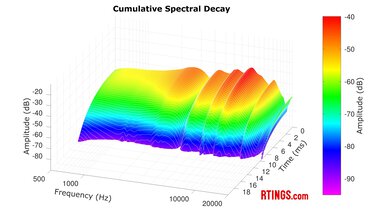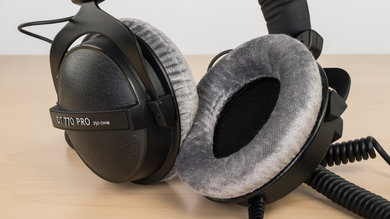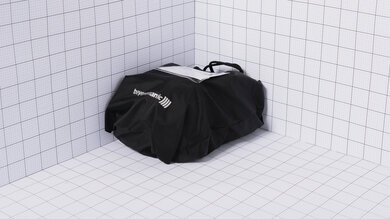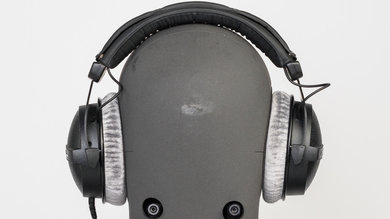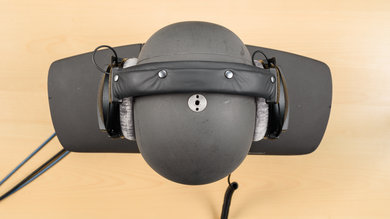The Beyerdynamic DT 770 PRO are closed-back, over-ear studio headphones handmade in Germany. Thanks to their closed-back design, they're more versatile and have a slightly better bass response than the Beyerdynamic DT 990 PRO or Beyerdynamic DT 880. They're intended to be sturdy and durable for professional or critical listening applications. They come with a padded headband and velour earpads to make them comfortable for extended listening sessions. This combination of great construction, comfort, and closed-back design means they're an industry-standard model found in recording studios worldwide.
Our Verdict
Due to their bulky build and wired design, we don't recommend using the Beyerdynamic DT 770 PRO for sports or fitness use.
- Sturdy, durable build quality.
- Leaky at higher volumes.
- Bulky design.
The Beyerdynamic DT 770 PRO are poor headphones for travel. While sturdily built, their poor noise isolation performance means you'll easily hear external sounds like bus engines and other commuter noises. The lack of controls also makes them difficult to use on the go. That said, they're comfortable enough to wear for longer journeys.
- Sturdy, durable build quality.
- Bulky design.
- Poor noise isolation performance.
The Beyerdynamic DT 770 PRO are poor for office use. They leak too much to use in a quiet office environment, and since they're not designed to block out background noise, you'll hear the conversations of those around you.
- Sturdy, durable build quality.
- Leaky at higher volumes.
- Bulky design.
- Poor noise isolation performance.
The Beyerdynamic DT 770 PRO are wired-only headphones; you can't use them for wireless gaming.
The Beyerdynamic DT 770 PRO are mediocre for wired gaming. These headphones lack a microphone, so you'll need a standalone microphone to input audio. If you already have a mic (or don't need one), their sound is ideal for dialogue and musically-rich gameplay. They don't deliver as much bass as dedicated gaming headsets, though, and this may be a downside if you're looking for a really thumpy, rumbly sound from sound effects like explosions. Finally, their frequency response consistency is only adequate, so different users can expect to hear a different sound, particularly in the bass range.
- Sturdy, durable build quality.
- Stable and well-padded.
- Bulky design.
- Those with larger heads can find their fit too tight.
The Beyerdynamic DT 770 PRO are decent when it comes to audio reproduction accuracy. Their frequency response doesn't deviate too much from their bright sound profile. While the prominent treble range can be fatiguing over time, it can be advantageous for some pro audio work, like identifying clicks and pops between edits. Their L/R drivers are mostly well-matched in amplitude, frequency, and phase, too, indicating tight tolerances between them. You don't need to worry about any coloration or degradation of audio fidelity either, as harmonic distortion remains low, even at higher volume levels. There's a phase shift in the mid-bass that's reflected in the group delay, though, which results in a slightly loose bass range.
The Beyerdynamic DT 770 PRO are a poor choice for noise isolation compared to headphones with dedicated ANC systems. While their closed-back design attenuates some treble and high-mid frequencies, like background conversations, they won't do much to isolate you from the pounding kick drums of a drummer tracking in the same room. They're still suitable for certain tracking applications, though, given that ANC-equipped, low-latency headphones are harder to come by.
The Beyerdynamic DT 770 PRO don't have a built-in mic.
These headphones have an okay frequency response consistency. However, due to a weaker seal, glasses wearers or those with smaller heads may experience reduced bass.
Performance Usages
Changelog
-
Updated Sep 22, 2025:
We've rectified an issue that affected the Bass, Mid, and Treble Compliance scoring, as well as Peaks and Dips with these headphones.
-
Updated Jul 29, 2025:
We've updated the Sound Profile box with a link to a downloadable folder of EQ settings that will help you match these headphones' frequency response to different target curves available in our Graph Tool.
-
Updated May 21, 2025:
The Group Delay box was updated to compare the FIIO FT1.
-
Updated Apr 25, 2025:
This review has been updated to Test Bench 2.0, which adds the following tests: Stereo Mismatch, Group Delay, Cumulative Spectral Decay, PRTF, Harmonic Distortion, and Electrical Aspects. We've added new performance usages and updated the text throughout the Sound tests and side-by-sides.
Check Price
Differences Between Sizes And Variants
The Beyerdynamic DT 770 PRO come in three variations with different impedances. Generally, higher-impedance headphones require more output from the connected device to produce audio at listenable volumes. We tested the 250-ohm version, which Beyerdynamic recommends for use in the studio with professional devices that provide additional amplification. They recommend the 80-ohm version for general studio use and the 32-ohm model for mobile devices like laptops and smartphones. These headphones are also offered in a 'Limited Edition' version featuring black earpads. If you find other variants, please don't hesitate to let us know in the comments.
Popular Headphones Comparisons
The Beyerdynamic DT 770 PRO are closed-back reference headphones well-suited to professional and critical listening applications. They offer a comparable sound performance to other closed-back headphones from this manufacturer, like the Beyerdynamic DT 700 PRO X and Beyerdynamic DT 1770 PRO, at a lower price point than these premium offerings. They lack a detachable cable, meaning you'll have to replace the entire pair if it fails. The Audio-Technica ATH-M50x come with a detachable cable and are a good choice for users who find the treble response in Beyerdynamic headphones to be fatiguing. Those who prefer a wider, more expansive sound with a more comfortable fit and don't care about audio leakage will want to try the open-back Beyerdynamic DT 880 and Beyerdynamic DT 990 PRO.
See our recommendations for the best DJ headphones, the best headphones for studio, and the best headphones for music.
The Beyerdynamic DT 770 PRO and the Sony MDR-7506 are both closed-back headphones. While both have a bright sound profile, the Sony have a bit more treble emphasis. Meanwhile, the Beyerdynamic have a better build quality and a more comfortable, stable fit, along with a more open sound. However, the Sony leak much less audio.
The Audio Technica ATH-M50x and the Beyerdynamic DT 770 PRO have very similar performance, but some might prefer the better build quality of the Beyerdynamic. Their metal frame feels sturdy, and the soft padding fabric feels nice on the skin. However, they can be tight for some, especially if you have a larger head. They might also sound a bit sharp for some and don't come with as many cable options as the Audio Technica.
The Beyerdynamic DT 770 PRO are better built closed-back over-ears with tighter L/R matching than the FIIO FT1. However, whether you'll like the Beyerdynamic cans more than the FIIO also depends on your preferred tuning, as the Beyerdynamic have a conservative bass and a bright treble, while the FIIO are considerably bassier with a warmer top-end. On the other hand, the FIIO leak less of your audio and block out noise a bit better. The FIIO are much easier to drive with different audio sources than the 250Ω version of the Beyerdynamic we reviewed, and you can easily swap out the FIIO's cable, whereas the Beyerdynamic's cable is hardwired.
The Sennheiser HD 560S and the Beyerdynamic DT 770 PRO are meant for different applications, so which is better is determined by your needs. The Sennheiser are open-back headphones with a much better PRTF accuracy, which is indicative of a wider soundstage. They're much more comfortable and have a more consistent bass delivery. On the other hand, the Beyerdynamic have a closed-back design, which supplies more low-end. The headphones leak less audio, and they isolate you from a bit more ambient sound, so you can wear them in noisier spaces than the Sennheiser. They also have a significantly better build quality.
Test Results

The Beyerdynamic DT 770 PRO have a bright sound profile and a flat mid-range that's suitable for a variety of audio content.
If you'd like to EQ these headphones to match one of our featured target curves in the Graph Tool, we've uploaded a folder of EQ parameters you can download to help you get started.
These headphones have okay frequency response consistency. The bass range is quite inconsistent across different users. In particular, those who wear glasses or have smaller heads might notice a reduced bass response as the headphones struggle to provide a tight seal. They're also a bit inconsistent in the treble ranges, so you might notice small deviations in response based on how you position them on your head.
The Beyerdynamic DT 770 PRO do a good job of following our target curve in the bass range. Overall, the response is a little underemphasized compared to our target, so tracks with 808s can feel light on thump and rumble. That said, a bit more high bass helps add warmth back into the mix. If you enjoy a more bass-heavy sound overall and want a more casual, wireless design, you can check out the Sony WH-XB910N Wireless.
The mid compliance to our target is outstanding. The response is virtually flat, allowing for extremely accurate reproduction of vocals and lead instruments.
The Beyerdynamic DT 770 PRO have decent compliance with our treble target. A subtle under-emphasis in the low treble causes vocals and lead instruments to lose a little of their brilliance. As with other headphones in the Beyerdynamic lineup, there's a noticeable bump in the mid to high treble that causes sibilants like cymbals and whispery vocals to sound harsh and piercing. Even though this can sound fatiguing over time, some people may prefer this sound as it can help emphasize imperfections in your mix.
These headphones have decent peaks and dips performance. While the response is generally even, there are some deviations from their overall bright sound signature. The slight dip in the mid-bass removes some body from instruments and vocals. In the treble range, there are a few peaks and dips that cause vocals and instruments to be alternatingly harsh or veiled, depending on the frequency. Sibilants like cymbals also err on the side of piercing.
The Beyerdynamic DT 770 PRO left and right drivers are amazingly well matched in both amplitude and phase. There are only minor mismatches across the frequency range, which will be difficult to hear in real-life content. There's a small phase mismatch in the mid-bass that's visible as a dip in the frequency response, as well as another small phase mismatch between the high-bass and low-mid, which will be difficult to hear with full-range content.
The group delay performance is poor. Our group delay tests show a negative phase shift in the low and mid-bass regions, which translates to a dip that's clearly visible in the frequency response graph. Consequently, bass frequencies lack tightness compared to other closed-backs like the FIIO FT1.
The Beyerdynamic DT 770 PRO have an adequate PRTF performance. While their level of pinna interaction is quite a bit less than that of an angled reference speaker, they can still create some perception of space within mixes. If you're looking for a more immersive listening experience that's closer to a reference monitor in a treated room, it's worth looking at open-back headphones like the HiFiMan Edition XS.
These headphones have outstanding harmonic distortion performance. At 94dBSPL and 104dBSPL, there's no audible degradation of the sound due to the generation of unintended harmonics.
We tested the 250-ohm version of these headphones, which is most suitable for professional end applications, where the drivers benefit from additional amplification. We tried using these headphones on an Android phone instead of through our usual headphone amp and noticed that they lacked a lot of bass. It's worth noting, however, that Beyerdynamic currently produces three variants of this model: 32-, 80-, and 250-ohm variants. The manufacturer advertises the 80-ohm version as a universal studio-use model, and the 32-ohm version is aimed at more mobile applications. While we haven't tested these variants, users who primarily listen to audio through a smartphone or laptop might find their music sounds better (and louder) with the 32-ohm version.
These are the settings used to test these headphones. Our results are only valid when used in this configuration.
The Beyerdynamic DT 770 share a similar design to the open-back Beyerdynamic DT 990 PRO. They have the same circular plastic ear cups and a thick metal frame with a removable cushion strap. They have a matte, black finish with plush gray velour earpads. There's also a 'Limited Edition' variant with black earpads for a sleek, all-black look. It's worth noting that these earpads are easily replaceable, and you can buy both colors directly from Beyerdynamic.
The Beyerdynamic 770 PRO are decently comfortable to wear for short periods and are amply padded. The ear cups are covered with a soft microfiber fabric that feels nice on the skin and fits well around most listeners' ears. Unfortunately, like the Beyerdynamic DT 990 PRO, they clamp the head a bit, which gets uncomfortable after a while—especially for those with larger heads.
The Beyerdynamic DT 770 PRO, like the Beyerdynamic DT 880 and Beyerdynamic DT 990 PRO, aren't portable headphones. They're not designed to be portable and are best suited to home or studio use. The ear cups don't fold or lay flat, and although they have a relatively compact build for an open over-ear model, they're still too bulky and cumbersome to carry on you without a bag.
The Beyerdynamic DT 770 PRO are durable and sturdy headphones. They have the same solid metal frame as Beyerdynamic DT 990 PRO, and the ear cups are dense enough to handle drops without getting damaged. However, the ear cup enclosures feel a bit plasticky, especially compared to the premium build and feel of the Beyerdynamic DT 880's ear cups.
The Beyerdynamic 770 PRO are tight enough on the head that they won't fall during casual listening sessions unless the non-detachable cable gets hooked on something. However, they're too bulky to run with comfortably. The large ear cups will slide off your ears under high physical activity, so like most critical listening headphones, they won't be ideal for taking to the gym.
The Beyerdynamic 770 PRO have a poor noise isolation performance. They isolate passively using their closed-back ear cups design but aren't the most effective at blocking out background noise like traffic or construction. They can reduce some mid range noise like ambient voices, but it isn't enough for a busy office.
These headphones also don't fare well when isolating against common scenarios either. You'll hear most of the rumbles of airplane engines or traffic on a busy street. They also have a hard time reducing noise in a typical office setting.
These headphones have a disappointing leakage performance. The main issue is that the leakage spans a broad range across the mid and treble ranges. If you play music at a high volume, these frequencies are the most likely to leak into your environment. In environments like an office, this level of leakage will be audible to others nearby. For those in a noise-sensitive environment looking for reference headphones that leak less, it's worth checking out the AKG K361 or AKG K371 instead.
These headphones come with a non-detachable TRS cable with a standard 1/8" jack and a 1/8" to 1/4" adapter so you can plug into devices like soundcards. The lack of a detachable cable means that any breakage in it or the jack will require you to replace the headphones themselves rather than just the cable. To compare, the added luxury of a removable cable, like on the Sennheiser HD 620S, can extend the lifespan of your headphones and allow you to customize the overall cable's length with aftermarket options.
You can use these headphones wired on PlayStation if you plug their 1/8" TRS cable into a controller. However, you'll need an external microphone to input audio.
You can use these headphones wired on Xbox if you plug their 1/8" TRS cable into a controller. However, you'll need an external microphone to input audio.

